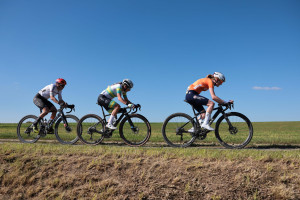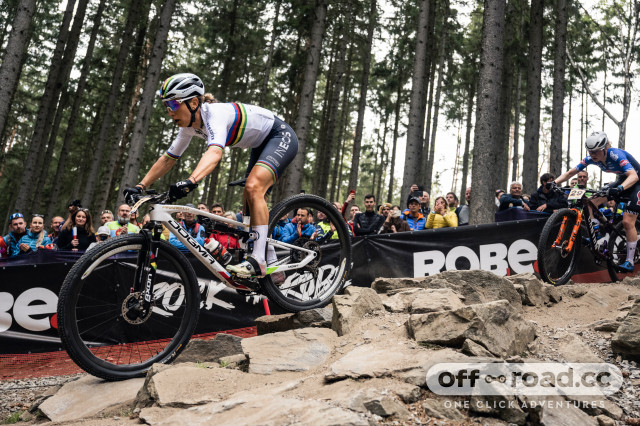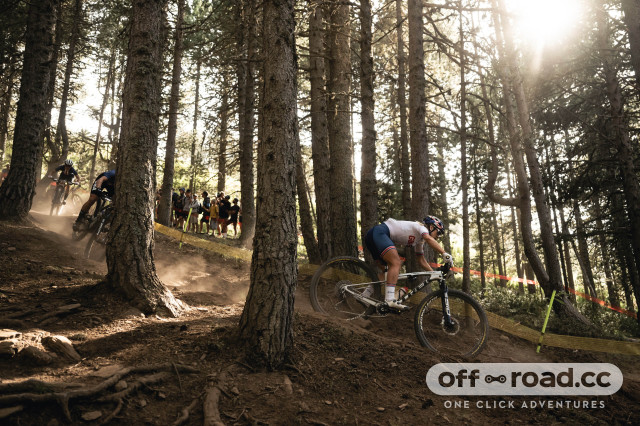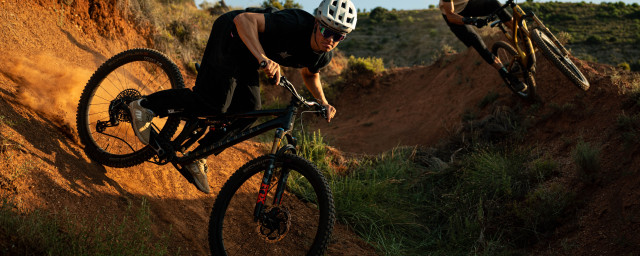What is Cross-Country Short Track? Everything you need to know about XCC
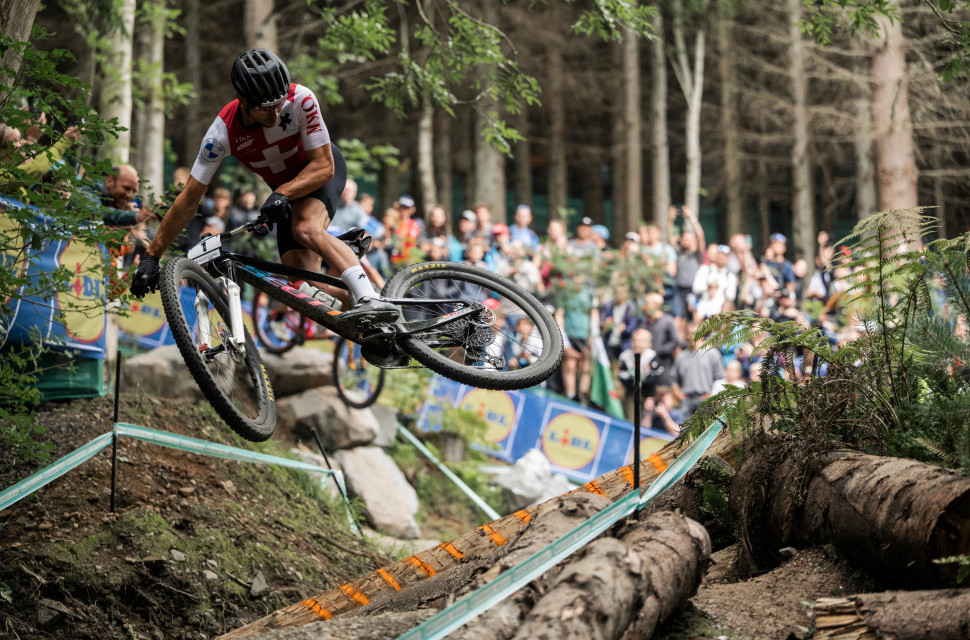
[Words by Steve Thomas]
Over the years, mountain biking has developed well and truly, or should we say matured? Along its relatively fast-tracked ride to the current UCI World Elite “format” of mountain bike racing, it has perhaps fragmented, gone off on tangents, grown up with a serious face, and become much faster, more furious. This is a far cry from the free and easy clunker days, at least at the racing end of the sport – and that can be seen to be either for the better or worse, depending on who you ask.
- Cross-country mountain biking: everything you need to know
- Are cross-country bikes the new quiver killers?
- Cross-country racing – where next for the UK?
By the time the first official UCI World Championships were in Durango in 1990, there had already been “unofficial” European and American World Championship races, as well as other iterations of the World Cup and the once dominant NORBA National series in the US, all pre-UCI involvement or acknowledgement of the sport.
Many of the early MTB races took a weekend stage race format. Riders would tackle trial courses, take on the downhill and then ride cross country – at a far longer distance than today’s XCO races, and were often more akin to what is now termed “marathon” races.
At that first World title bout things were pretty simple – with just a downhill and cross-country race for the rainbow bands, and an “un-medaled” hill climb race, which was won by Britain’s Tim Gould. Back then many riders raced up, down, and around and over stuff, and on the same bikes, too.
Fast forward some and the gravity side of things became virtually separated from the cross-country racing, the stakes got higher, the racing became more formulated, a couple of other XC iterations had a short airing on the global stage, and this evolved to the current World Cup and World Championship formats and events that we have.
XCC, the new kid on the block?
If you follow the UCI MTB World Cup or the World Championships you’ve probably seen the XCC races, which happen on the Friday before the Elite finals of the regular XCO races on the Sunday. Many viewers and fans tend to tune in for the highlights or the live coverage of the “big one,” the XCO, which is no surprise given that it is the blue riband event in cross-country terms, hence XCC doesn’t quite get the same level of exposure, or status as its big brother.
The XCC races are held on a course of 1-1.5km in lap distance, and the riders cover around 6-8 laps during the 20–25-minute duration of the race. Naturally, these are all out-action affairs and are perhaps even more exciting to watch than the main XCO races. The courses mostly use the same start and/or finish area as the XCO races and generally take in sections of the XCO courses, too, but not always, and riders must use the same bike for both the XCC and XCO races.
Dirt criteriums have been around since the early days of the sport, although they were rarely technical (which XCC is), and short track racing has been dropping in and out of the World Cup weekends in one form or another for many years. The first official XCC World Cup race took place in Albstadt in 2018 when Mathieu van der Poel and Annika Langvad took victory, but it would be a while until it really took off.
In 2021 the discipline truly came into its own when it was granted World Championships status, and in 2022 XCC also got its very own World Cup title series.
How has XCC impacted XCO racing and the World Cup?
It would be fair to say that some perhaps saw XCC racing as a bit of a fad early on, and perhaps some riders even skipped the race to preserve their firepower for the main Sunday XCO showdown, which, after all, is what cross-country racing has long since been based on. However, doing that now has become a faux-pas – as not only are there a fist full of much prized UCI World Cup series points on offer (250 XCC points for a win and also 80 XCO points are earned), the XCC race results determine the crucial first start three rows/24 slots for the XCO final to follow, which make a solid XCC finish essential for the leading riders.
Until the past few years many purist XCO racers had their efforts and preparations fully homed and fine-tuned to go all in for a one-off weekend blast of around 90 minutes, and so when you throw in a 25-minute Friday night basting in lactic acid, well – that takes some adjusting too, especially for those a tad longer in the tooth.
Either way, it was a case of adapt or err, to start three rows back on the grid, which is a long way in terms of the intense and relatively short XCO racing we now have. For many, the XCC has proven key to getting themselves front-row seats for the big fights, while for others it’s been more of a necessary evil, as XCC does tend to suit some of the punchier riders over the sloggers, and that’s all part of the game.
Is it fair? Well, it’s the way it is – for now at least, and it does give many more riders a crack at the frontline battle, which is always good for the sport on the whole. Does XCC warrant World Championship status? Why not? It may not hold the same status as XCC, but surely holds higher status in some other cross-country events around, and the rainbow jersey does get to be worn at every World Cup XCC event.
From the insider’s side – that of riders and sponsors, having World Championships status is a big deal. Not only does it give those brands something to shout about, but it also dishes the riders more status and earning potential, too, and all those medals and UCI points certainly won’t go amiss with the powers that be in their national federation offices – and points mean prizes and those prizes often come in the form of funding, plus more recognition for mountain biking within those realms too – which is all positive.
What about the fans? As a spectator it’s a win-win situation too – be that in person or on TV. There’s little enough mountain biking on our screens as it is, a short extra double shot is a great bonus – and let’s face it, it’s almost like watching a full-blown XCO race run off at a faster and more condensed pace, which is exciting to watch.
The question marks?
Looking purely at XCC and its inherent relationship with XCO racing, I guess, it would be fair to question whether or not it would be better to run as a standalone event/series (on the same weekend), as in not being so intransigently lined to XCO starting lots, which would give riders a choice of whether to ride or not. The issue here is that it would likely lead to a much less prominent field – unless it still carried overall XCO series points, too.
Perhaps an even bigger, and certainly more controversial question would be – why not mix the World Cup up some? Maybe even take an element of it back to the big mountains by making a couple of rounds of the much-overlooked UCI Marathon World Cup a part of the show, which in turn would greatly boost the profile of marathon racing, and open things up all the more.
Some purists and media would froth at the mouth at the mere idea of making two or three-four-hour races part of the regular World Cup series and, although it would be tougher to televise and perhaps even market in that form, it would certainly broaden and liven things up – which, sure is a good thing?
The strange thing is that when you look at the results in XCC, XCO, and also XCM (marathon), you often see the same names towards the top of the result board, and they do say that variation is the spice of life.
